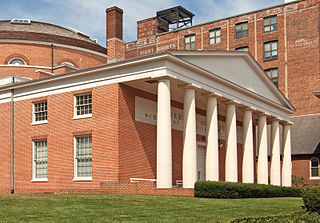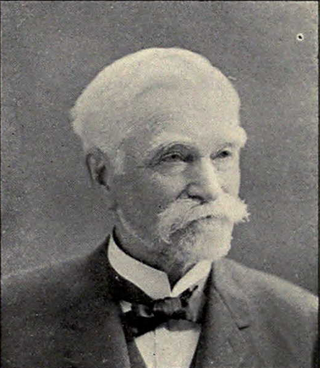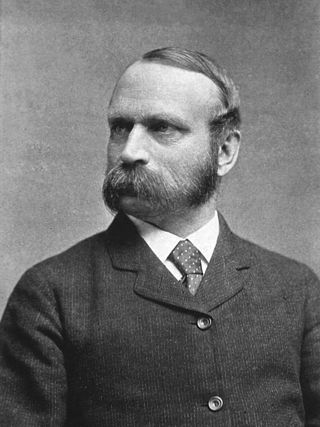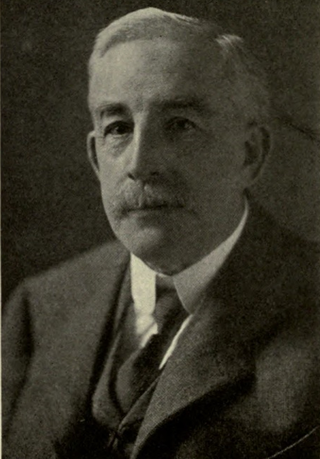Lewis Henry Steiner | |
|---|---|
 | |
| Born | 4 May 1827 |
| Died | 18 February 1892 |
Lewis Henry Steiner (May 4, 1827 – February 18, 1892) was an American medical doctor and librarian. He was a member of the Maryland Senate from 1872 to 1884.
Lewis Henry Steiner | |
|---|---|
 | |
| Born | 4 May 1827 |
| Died | 18 February 1892 |
Lewis Henry Steiner (May 4, 1827 – February 18, 1892) was an American medical doctor and librarian. He was a member of the Maryland Senate from 1872 to 1884.
Lewis Henry Steiner was born in Frederick, Maryland.
He was educated at Marshall College, Pennsylvania, where he received the degree of A.M. in 1849, and was graduated the same year at the medical department of the University of Pennsylvania. He began to practise in Frederick, but in 1852 moved to Baltimore, where for three years he was associated with John R. W. Dunbar in the conduct of the Baltimore Medical Institute, at the end of which time he returned to Frederick. [1]
Soon after he began to practise his attention was especially directed to chemistry and the allied sciences, and during his residence in Baltimore his time was largely occupied in teaching. He was professor of chemistry and natural history in Columbian College, Washington, D.C., and also of chemistry and pharmacy in the National Medical College, Washington, in 1853; lecturer on chemistry and physics in St. James College, Maryland, in 1854; lecturer on applied chemistry in the Maryland Institute in 1855, and professor of chemistry in the Maryland College of Pharmacy in 1856. [1] By 1855, he had given up the practice of medicine to devote his career to the natural sciences, botany and chemistry in particular. [2]
During the Civil War, he was actively employed as an inspector by the United States Sanitary Commission, and for a period was in charge of its operations in the Army of the Potomac as chief inspector. [1] He published a brief history of the Commission in 1866. [2]
He became president of the Frederick County School Board in 1865 where a major interest was in developing school facilities for African-American children. [2] In 1871 he was elected by the Republicans to the Maryland Senate, representing Frederick County for four years. He was re-elected for a like term in 1875, and again in 1879. He served until 1884. From 1855 until 1858, he was a contributor to, and afterward assistant editor of, The American Medical Monthly. [1] [3] His efforts were chiefly responsible [4] for the Maryland General Assembly adopting the 1876 Great Seal of Maryland, which remains the State's Seal to this day. [5]
In 1884 he was appointed librarian of the Enoch Pratt Free Library, remaining there until his death. [1] He was a Reformed Church elder. [2]
A collection of his papers is held at the National Library of Medicine in Bethesda, Maryland. [6]
In 1866, he married Sarah Spencer Smyth. They had six children, of which one, his son Bernard Christian Steiner, succeeded his father as librarian. [2]
He published other translations from the German, with monographs, reports, lectures, and speeches.

William Barton Rogers was an American geologist, physicist, and educator at the College of William & Mary from 1828 to 1835 and at the University of Virginia from 1835 to 1853. In 1861, Rogers founded the Massachusetts Institute of Technology. The university opened in 1865 after the American Civil War. During the time Rogers lived in Virginia, he was a slaveowner, with two slaves in his household in 1840 and six slaves in 1850; one, his cook, was Isabella Gibbons. Because of his affiliation with Virginia, Mount Rogers, the highest peak in the state, is named after him.

Daniel Coit "D. C." Gilman was an American educator and academic. Gilman was instrumental in founding the Sheffield Scientific School at Yale College, and subsequently served as the second president of the University of California, Berkeley, as the first president of Johns Hopkins University, and as founding president of the Carnegie Institution.

The University of Maryland, Baltimore (UMB) is a public university in Baltimore, Maryland. Founded in 1807, it comprises some of the oldest professional schools of dentistry, law, medicine, pharmacy, social work and nursing in the United States. It is the original campus of the University System of Maryland and has a strategic partnership with the University of Maryland, College Park. Located on 71 acres (0.29 km2) on the west side of downtown Baltimore, it is part of the University System of Maryland.

Amos Nourse was a medical doctor who became a U.S. Senator from the state of Maine for a very short term. Born in Bolton, Massachusetts, he graduated from Harvard College in 1812 and from Harvard Medical School in 1817. At first settling in Wiscasset, and subsequently in Hallowell, Maine, he finally removed to Bath, Maine in 1845. He was collector of customs at Bath from 1845 and 1846 and commenced practice of medicine in that city. He was lecturer on obstetrics at Bowdoin College from 1846 to 1854, and professor of that branch from 1855 to 1866.

Albert Benjamin Prescott was an American chemist. He graduated in medicine at the University of Michigan in 1864, and was made assistant professor of organic and applied chemistry, dean of the school of pharmacy, and director of the chemical laboratory over the years. Professor Prescott served as president of the American Chemical Society in 1886, president of the American Association for the Advancement of Science in 1891, and president of the American Pharmacists Association in 1900. During his tenure as Dean at the University of Michigan College of Pharmacy, Prescott encouraged the foundation of what is now the Phi Delta Chi professional pharmacy fraternity. He is buried with his wife and children at Forest Hill Cemetery, adjacent to the University of Michigan Central Campus.

Charles Frederick Chandler was an American chemist, best known for his regulatory work in public health, sanitation, and consumer safety in New York City, as well as his work in chemical education—first at Union College and then, for the majority of his career, at Columbia University, where he taught in the Chemical Department, the College of Physicians and Surgeons, and served as the first Dean of Columbia University's School of Mines.

John Henry Rauch was an American sanitarian. He brought attention to public health problems posed by cemeteries in large cities and handled the public health emergencies posed by the Chicago fire of 1871. He was the founding president of the Illinois State Board of Health.

Bernard Christian Steiner was a United States educator, librarian and jurist.

James Blythe Rogers was a United States chemist.

Robert Empie Rogers was an American chemist.
Washington Medical College was a medical school in Baltimore, Maryland. It was founded in 1827, incorporated in March 1833 as TheWashington Medical College of Baltimore, renamed to Washington University of Baltimore in 1839, closed in 1851, revived in 1867 as Washington University of Baltimore, and disbanded in 1878. The remains were absorbed into the College of Physicians and Surgeons, later merged with the University of Maryland School of Medicine.

Dr Alexander Tweedie FRS was a Scottish physician and writer.

Charles Frick was a Baltimore physician.
August Dupré (1835–1907) was a German chemist, a Fellow of the Royal Society, and naturalised in the United Kingdom in 1866.
Henry Willis Baxley was an American physician who helped to found the Baltimore College of Dental Surgery in 1839. This college has been variously described as the first dental college in the United States, in the world, and in North America.

Henry Leffmann was an American chemist, physician and writer.

Joshua Webster Hering was an American politician, physician and banker. He served as a member of the Maryland Senate from 1896 to 1900 and as Comptroller of Maryland from 1900 to 1904 and 1908 to 1910.
William Edward Augustin Aikin, known professionally as William E. A. Aikin, was an American analytical chemist and natural scientist. He was chair of the chemistry department at the University of Maryland from 1837 to 1883. While most of his work focused on chemistry, he held accomplishments in other fields in the natural sciences.
John Alexander Steiner was an American politician from Maryland. He served as a member of the Maryland House of Delegates, representing Frederick County in 1867.

Noah Bowlus was an American politician from Maryland. He represented Frederick County in the Maryland House of Delegates from 1868 to 1872 and in the Maryland Senate from 1884 to 1888.